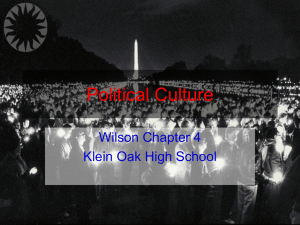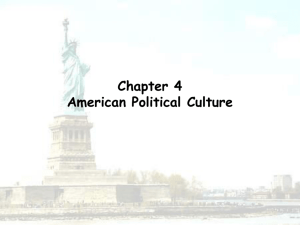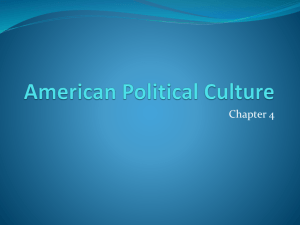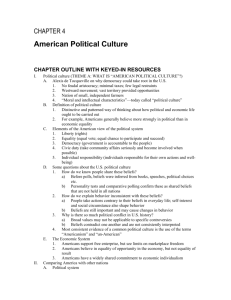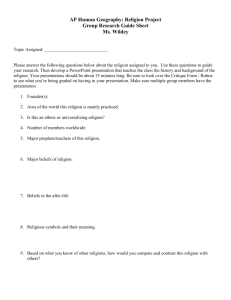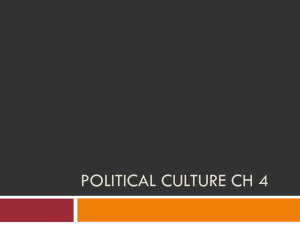chapter4 - TJ
advertisement
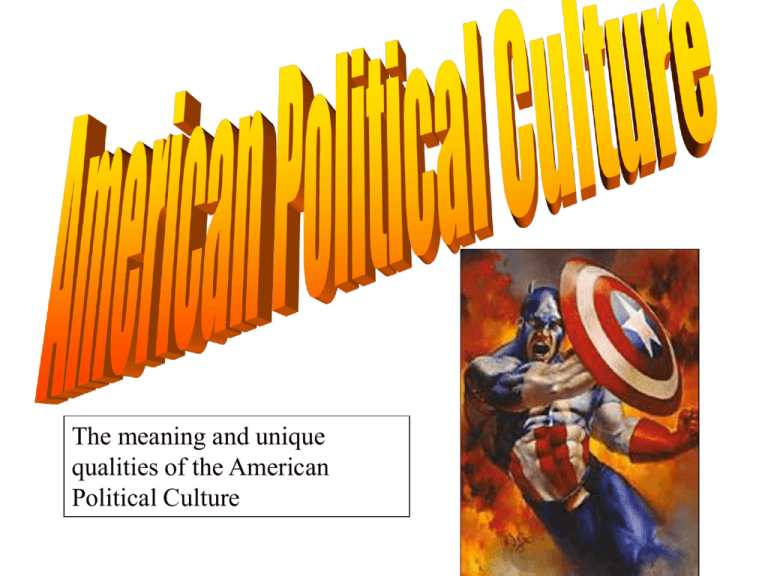
The meaning and unique qualities of the American Political Culture Have you ever heard of Captain France? Intro •generalizations about countries can vary, even when they are all representative democracies •Different populations have very different republics •Culture counts when it comes to politics and government •“Americanism,” liberalism, conservativism, etc heavily influence definition of political efficacy. •In general, the beliefs of a people greatly influence the way in which a government operates regardless of the form of government. What defines political culture? •Constitutional Differences •Institutions, features of gov, power relationships •Demographic differences •Race, language, religion •Cultural Differences •“Americanism” Definition •Distinctive and patterned way of thinking about how political and economic life ought to be carried out •I.e. American generally believe more strongly in political than in economic equality Important elements of American Political Culture: •Liberty •Equality •Democracy •civic duty •individual responsibility Liberty •Americans are preoccupied with their rights. They believe they should be free to do pretty much as they please, with some exceptions, so long as they don’t hurt other people or infringe upon their rights. Democracy QuickTime™ and a decompressor are needed to see this picture. •Americans think government officials should be accountable to the people Civic Duty QuickTime™ and a decompressor are needed to see this picture. •Americans generally feel people ought to take community affairs seriously and help out when they can QuickTime™ and a decompressor are needed to see this picture. Individual Responsibility •A characteristically American view is that, barring some disability, individuals are responsible for their own actions and wellbeing Equality •Americans believe everybody should have an equal vote and an equal chance to participate and succeed. General Questions about U.S. Political Culture •How do we know people share these beliefs? •Before polls, beliefs were inferred from books, speeches, and political choices •How do we explain behavior inconsistent with beliefs? •Beliefs are still important and may cause changes in behavior •Why is there so much political conflict in U.S. History? •Beliefs contradict one another and are not consistently prioritized The Economic System of the U.S. •Americans believe first and foremost in free-enterprise •Free-market •Capitalism •Adam Smith •Americans believe in equality of opportunity in the economy, but not equality of result •Justifies the extremely wealthy •Few are upset at Bill Gates, Warren Buffet etc. •Americans have widely shared commitment to economic individualism •Help those only “truly in need,” economic responsibility America’s Difference in Political Culture Americans… • tend to assert individual’s rights and freedoms • emphasize individualism, competition equality, following rules, treating others fairly but impersonally • lag in voting rates but not other forms of political participation • have more confidence in government institutions America’s Difference in Political Culture Americans… •acknowledge flaws but are still “proud” of their national identity and “would be willing to fight” for their country in the event of a war • are highly religious compared to Europeans • allow religion to play important role in shaping politics • both liberals and conservatives use religion The Sources of Political Culture Historical Roots • American Revolution- assertion of liberties and rights •Constitution- reconciled personal liberties with government •Counter culture- people’s want for guarantee against government •Distrust of authority stemming from historically corrupt governments •Reflection of majoritarian view that human nature is somewhat depraved •legitimated the role of the opposition party, demonstrating that liberty and political change can coexist The Sources of Political Culture Legal-sociological factors • Widespread participation permitted by Constitution •Religious diversity •No established religion •Puritan belief system stressed personal achievement •Protestant Ethic” •Work hard •Save money •Obey law •Do good for others •Miniature political systems established through church parishes and communities The Sources of Political Culture Legal-sociological factors • Family values •Greater freedom for children and the younger generations •Leads to belief in rights and acceptance of diverse views •High degree of class consciousness absent •Most people consider themselves middle class •Even unemployed do no appose management of government •Horatio Algiers myth The Sources of Political Culture Culture War •Culture classes in America battle over values •Money is not at stake •Compromises are almost impossible •Conflict is more profound •Ideologies/values/beliefs----> religion •Culture conflict animated by deep differences in people’s beliefs about private and public morality-- standards that ought to govern individual behavior and social arrangements The Sources of Political Culture Culture War •What kind of country we “ought” to live in •Two main groups: Orthodox and Progressive •Orthodox- morality is as, or more, important than selfexpression and morality drives from fixed rules from God •Progressive: personal freedom is as, or more, important than tradition with changing rules based on circumstances of modern life •Orthodox- fundamentalist Protestants •Progressive- liberal Protestants The Sources of Political Culture Culture War •Culture War occurring between and within religious denominations •Affects people’s views on government •Trust •Sense of political efficacy •Sense of freedom •Sense of security Mistrust of Government •Dramatic Increase in 1960’s •“Crisis of Confidence” Carter •Polling •Less often trusted government to do what is right all or most of the time •Had diminished trust in President and Congress •Had virtually unchanged trust in supreme court •Had increased trust in state and local governments •Watergate, Vietnam, only increased trend •Mistrust of officials not process or institutions. Political Efficacy • definition: •citizen’s capacity to understand and influence political events •Two parts to political efficacy •Internal •Confidence in one’s ability to under and influence events; currently about the same as the fifties •External •Belief that system will respond to citizens •Not shaped by particular events •Declined steadily since 60’s •Americans seem to believe that government is becoming too big to respond to individual preferences •Still higher in America than Europe •American Political Culture is unique •Protection of individual liberties balanced with American’s dependence on morality •Values based decisions contradict legal/constituional decisions •Government focuses on constitutional •General public focuses on morality
